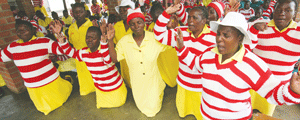
FEMALE prisoners continue to recycle sanitary wear, sleep on dirty, lice-infested linen soiled with blood and urine, a report has shown.
VENERANDA LANGA
The Research and Advocacy Unit (RAU) and Zimbabwe Women Lawyers’ Association report released on Tuesday said there was continuation of violation of human rights at prisons despite a 2004 Supreme Court ruling that spelled out that police holding cells should be reasonably sized, with good ventilation, sufficient lighting, and have clean, decent flushing toilets with running water.
The findings of the report were compiled after interviewing 20 female women rights defenders on their prison experiences.
“The conditions in detention facilities remain a cause of concern as cells both at police stations and in remand prison are small, poorly lit and dirty with poor ablution facilities,” reads the report.
“The toilets in the cells were dirty, most of them had no running water and could only be flushed from outside and the police and the prison officials did not provide toilet paper nor did they provide sanitary wear to the majority of women human rights defenders.” According to the report, while in police custody, women were not given a change of clothes and had to wear the clothes they were arrested in for the duration of their stay.
“In remand (prison), however, the women reported that they had adequate blankets as the Zimbabwe Revenue Authority (Zimra) donated new warm blankets to the remand prisons. Of concern, however, is the fact that some prison cells do not have enough beds corresponding to the number of inmates detained and some inmates have to sleep on the floor,” noted RAU.
Food in prison was said to consist mainly of sadza and dried kapenta, beans or spinach, and was of such poor quality that the women eat what their relatives brought them.
- Chamisa under fire over US$120K donation
- Mavhunga puts DeMbare into Chibuku quarterfinals
- Pension funds bet on Cabora Bassa oilfields
- Councils defy govt fire tender directive
Keep Reading
RAU said as a way to improve conditions at prisons, there was need to respect international laws regarding the rights and protection of women and girls as well as include participation of women at decision-making level.











